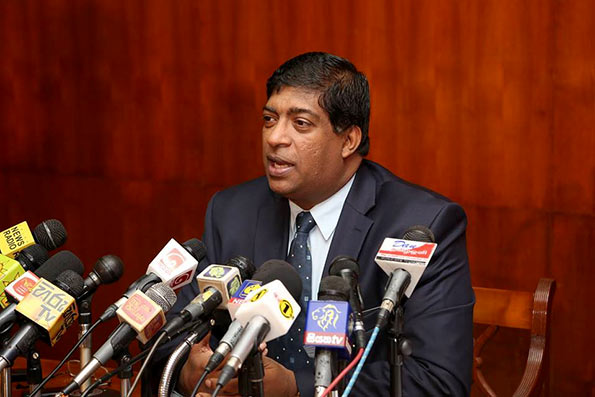Finance Minister contradicts IMF and Moody’s on growth stats

International Monetary Fund (IMF) and top credit rating company Moody’s Investors Service Singapore Pte. Ltd indicate that Sri Lanka will maintain 5 to 5.5 percent growth in 2016.
To overcome this crisis, Sri Lanka’s fiscal policies should be based on consolidation featuring a combination of expenditure restraint and durable revenue reforms, their sources said.
However, Minister of Finance Ravi Karunanayake told the media in London, “They were wrong”,referring to the IMF’s recent growth forecast of 5-5.5 percent for this year. “I think it will be in the range of 6.5-6.7 percent, he said. With the IMF expected to decide on a post-programme monitoring in mid-November, he said: “We would like them to see what we have done and show that they are with us, he said.
IMF staff mission led by Todd Schneider visited Colombo from September 8–18 to conduct post-program monitoring discussions and strongly emphasized the need to eliminate tax expenditure, which are tax exemptions, tax holidays and feature reduced rates as the most important components in a strategy to make the tax system simple, fair and efficient.
“The mission welcomes the authorities’ attention to the need for market-based structural reforms and efforts to reinvigorate key initiatives. Fuel and electricity pricing, subsidies, trade policy, liberalization of factor markets (particularly land), and the investment environment are areas that could play an essential role in sustaining high rates of economic growth, the IMF mission said.
Putting state firms on a commercial footing, allowing them to make market-based financial decisions (including pricing) and subjecting them to greater financial discipline will also help to reduce risks to the budget and the financial system, the mission added.
Moody’s Investors Service Singapore reported that Sri Lanka being a frontier market in the region, will witness a moderate growth of 5.5 percent,relative to recent peaks, as the Chinese economy slows down.
Given Sri Lanka’s institutional weaknesses in general, reforms that support inflation management, fiscal consolidation and a stable political outlook have the ability to raise sovereign credit quality and speed-up progress on structural issues, its report said.
Deputy Director, Institute of Policy Studies of Sri Lanka Dr. Dushni Weerakoon said at a forum that given the current economic situation, Sri Lanka is heading towards an IMF bailout because current foreign reserves are ample only for four months’ imports, which amount to US $ 4.5 billion.
(Source: The Island – By Hiran H. Senewiratne)

Latest Headlines in Sri Lanka
- Popular rapper Shan Putha arrested with firearm March 14, 2025
- Batalanda commission report tabled in Sri Lankan Parliament March 14, 2025
- Female Grama Niladharis withdraw from night duty over security concerns March 14, 2025
- Sri Lanka ranked as the best country for settling down March 14, 2025
- UN pledges support for Sri Lanka’s industrial and SME development March 13, 2025



The IMF has drawn their conclusions based on the information by the Central Bank which lacks credibility for the data is collated from various sources. The IMF is being generous in that they have estimated a growth rate around 5.5 percent
The mission recognises the fact that we are facing a financial crisis and made proposals to over come the crisis.
IMF does not bailout economies it provides loans provided that the government implement fiscal policies and this would involve `“The mission welcomes the authorities’ attention to the need for market-based structural reforms and efforts to reinvigorate key initiatives. Fuel and electricity pricing, subsidies, trade policy, liberalization of factor markets (particularly land), and the investment environment are areas that could play an essential role in sustaining high rates of economic growth, the IMF mission said’ and most likely expect the rupee to be further devalued.
I think they should appoint Sri Lanka’s FM as least in advisory capacity, if not the head of both institutions.
The good thing is after a couple of years, if anybody remembers this, they will be able to see who the harping idiot and who the experts were, when the facts and numbers are available.
Before January 8th they said they will revive the economy and geared up for better performance.
After 8th they empty the CB by doing the biggest fraud using the BONDS.
No actions thereafter, an all are silent still. Officers commented on this transferred.
Thereafter keeping on looking for others mistakes and undone any works.
After August, its into another era. Now all the efforts and the comments are totally different.
I don’t see a reason why still people are very quite. Despite all the lies and frauds still this government stands still.
Government failed in all the areas. Yet, no actions by the opposition or educated people in the country.
Seems like something really wrong.
We are moving towards to Greece or Zimbabwe disasters.
why not the IMF point out where electricity pricing is concerned we should follow are electricity laws and go for BOT coal power as many as needed to electrify our transport and for we the people to enjoy a high standard of living as our politicians who are getting free electricity but we the people want to pay for our electricity provided they are least cost in accordance to our electricity laws, at present our electricity is one of the highest priced electricity in the world and some of our politicians are misleading the people stating solar power is the most suitable for our grid when a KWh of solar power cost over 2..5 US$ that is nearly Rs300